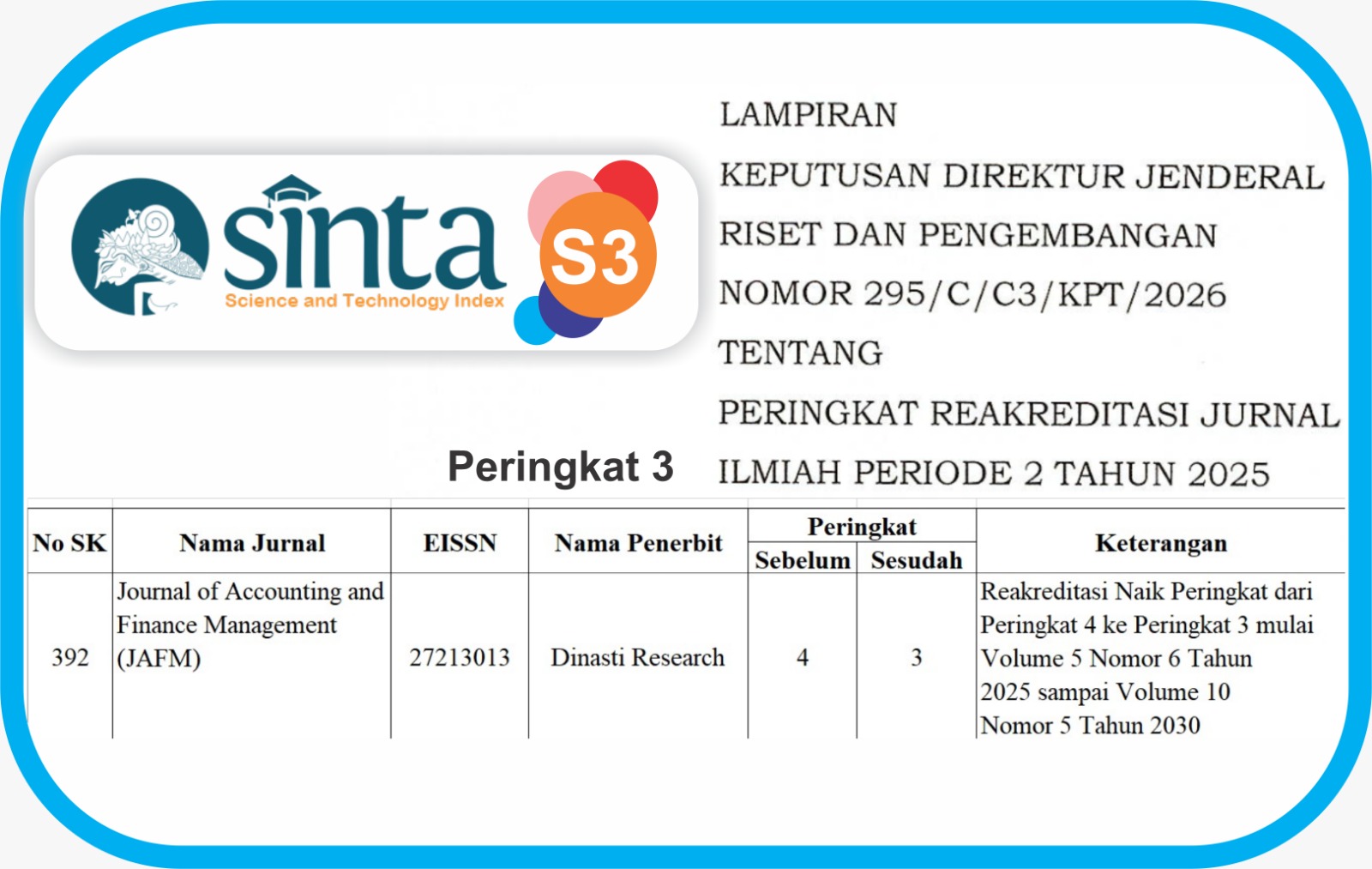Examining the Roles of Government Accounting Officers and Their Implications on Achieving Sustainable Revenue Budget: A Case Study of the Ekiti State Government, Nigeria
DOI:
https://doi.org/10.38035/jafm.v4i6.273Keywords:
Roles of accounting of officers, Expenditure control, Internal control, Revenue Management, Sustainable revenue budgetAbstract
The goal of this study was to uncover the significant impact of government accounting officers' roles on achieving sustainable revenue budgets and to comprehensively investigate how these officers' responsibilities affect the realization of such budgets in Ekiti State. In this research, a survey design was utilized. Data were collected directly from the source by distributing questionnaires to the designated participants, who were the Accounting Officers of the Ekiti State Government. The entire population consisted of 374 accounting officers, and we opted for a census sampling approach, which covers the entire population at 100%. Out of the total questionnaires distributed, 269 were returned with responses. The data collected was subsequently analyzed employing both descriptive and inferential statistical methods. The study found that the roles of accounting officers, specifically pertaining to expenditure control, internal control, and revenue management, have a positive and statistically significant impact on the attainment of a sustainable revenue budget within the Ekiti State Government. It is therefore concluded that when the government exercises strong control over its expenses, it is more likely to achieve its goal of sustaining a balanced and stable budget for the long term. This study recommends that government authorities should recognize the crucial role of accounting officers in achieving fiscal sustainability and provide the necessary support and resources to enable them to fulfill their responsibilities effectively.
References
Adewara, Y. M., Dagunduro, M. E., Falana, G. A., & Busayo, T. O. (2023). Effect of multiple taxation on the financial performance of small and medium enterprises (SMEs) in Ekiti State, Nigeria. Journal of Economics, Finance and Accounting Studies, 5(3), 121-129.
Akinadewo, I. S., Kayode, P. O., Dagunduro, M. E., & Akinadewo, J. O. (2023). Empirical examination of the relationship between contemporary tax administration systems and revenue generation capacity in selected states of Nigeria. International Journal of Developing and Emerging Economies, 11(2), 77-92.
Aluko, A. F., Igbekoyi, O. E., Dagunduro, M. E., Falana, G. A., Oke, O. E. (2022). Tax incentives and liquidity performance of quoted industrial goods firms in Nigeria. European Journal of Business and Management, 14(23), 11-22.
Andang, B., & Ali, S. (2022). The determinant factors in the policy formulation process for the regional revenue and expenditure budget. Journal of Business Administration, 8(2), 359-368.
Awotomilusi, N. S., Oke, O. E., Dada, S. A., & Dagunduro, M. E. (2023). Assessing the effectiveness of internal control systems on fraud prevention and detection of selected public institutions of Ekiti State, Nigeria. Asian Journal of Economics, Finance and Management, 5(1), 231-244.
Cesary, G. M. (2022). An assessment of the share of real estate tax revenues in the budget revenues of selected Polish cities from 2018-2021. Polish Journal of Marketing, 28(77), 141-160.
Elwan, L. M., Kadir, A., Rezkiawaty, S. U., & Qomariya, E. (2023). Implementation of convid-19 budget policy in Southeast Sulawesi (case study of budget refocussing and reallocation of regional revenue and expenditure budgets 2022). Journal of Governance and Public Policy, 10(3), 234-252.
Faris, I. A., Mhamoud, A. A., & Majeed, A. (2023). The impact of corporate tax evasion on the budget revenue decline: A case study of Jordan’s overall budget. International Journal of Applied Sciences & Development, 2(10), 90-100.
Hadisantoto, E. Arifuddin, Wawo, A. B., & Ridwan, M. (2023). The influence of original local government revenue, and specific allocation fund on government expenditure in Southeast Sulawesi District/City. Riset & Jurnal Akuntansi, 7(4), 3712-3719.
Ibrahim, M. (2019). Internal control and public sector revenue generation in Nigeria: An empirical analysis. International Journal of Scientific Research in Social & Management Studies, 2(1), 34-48.
Jensen, M. C., & Meckling, W. H. (1976). Theory of the firm: Managerial behavior, agency costs and ownership structure. Journal of Financial Economics, 3(4), 305–360. https://doi.org/10.1016/0304-405x(76)90026-x
Mpakaniye, J. P. (2023). The effect of internal audit on the budget process and execution of local government of Rwanda. Journal of Operational Management, 2(3), 1-25.
Mutua, G. M. (2023). Effects of internal control components on revenue generation among corporations in Kenya. African Journal of Commercial Studies, 2(1), 1-11.
Obid, M. (2021). The effect of tax privileges on local budget revenues. International Journal of Finance and Accounting, 6(1), 26-38.
Olatunji, C. O., & Dominic, O. O. (2019). Effect of internally generated revenue on budget implementation in Ekiti. Applied Finance and Accounting, 5(2), 10-19.
Thyaka, F. V., & Kavale, S. (2021). Effects of internal controls on revenue collection; A case of Kenya revenue authority. The Strategic Journal of Business & Change Management, 8(1), 347-363.
Utami, T. V., & Astutik, E. P. (2022). Analysis of regional revenue and expenditure budget of Magelang regency. Current Advanced Research on Sharia Finance and Economics Worldwide (Cashflow), 2(1), 267-274.
Wolak-Tuzimek, A., Tuzimek, W. (2021). The effect of indirect taxes on the state budget revenue. Central European Review of Economics & Finance, 35(4), 29-41.
Downloads
Published
How to Cite
Issue
Section
License
Authors who publish their manuscripts in this journal agree to the following conditions:
- The copyright on each article belongs to the author(s).
- The author acknowledges that the Journal of Accounting and Finance Management (JAFM) has the right to be the first to publish with a Creative Commons Attribution 4.0 International license (Attribution 4.0 International (CC BY 4.0).
- Authors can submit articles separately, arrange for the non-exclusive distribution of manuscripts that have been published in this journal into other versions (e.g., sent to the author's institutional repository, publication into books, etc.), by acknowledging that the manuscript has been published for the first time in the Journal of Accounting and Finance Management (JAFM).




























